
How women are redefining femininity in an era of alpha-male podcasts
Alpha-male podcasts are criticised for being misogynistic. What about the women that agree with their values?
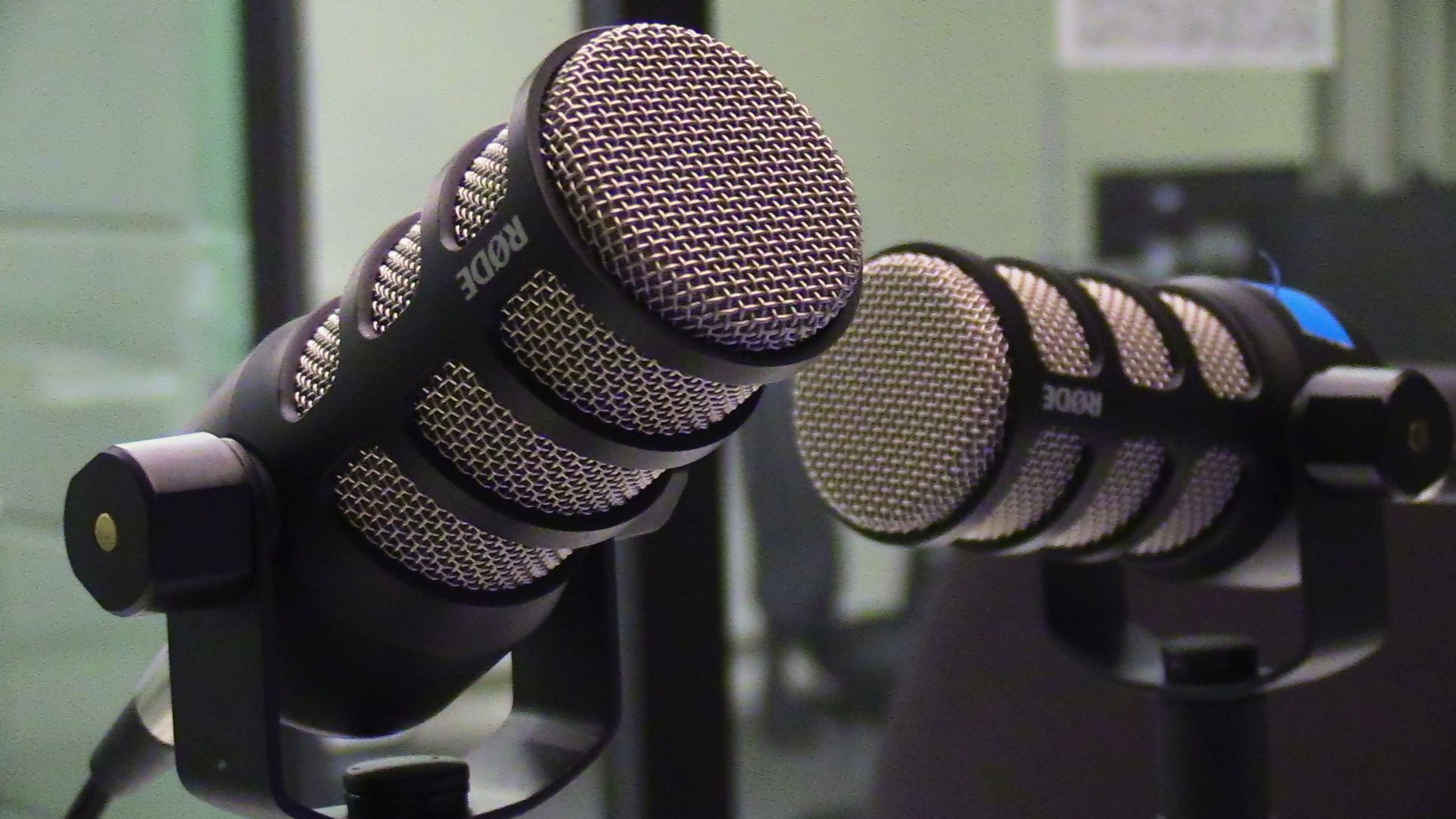
The rise of the alpha-male podcast could be driving the movement of women preferring traditional gender roles. | Mollie Hib/Vox
The rise of the alpha-male podcast could be driving the movement of women preferring traditional gender roles. | Mollie Hib/Vox
Mollie Hib is a junior reporter for Vox covering gender, politics and culture.
If you’ve been on social media, it’s likely that you’ve come across the alpha-male podcast. Advertised as shows providing lifestyle and relationship advice, the content provides one overarching message: successful men are above women and submissive men (also known as beta males). Rising to popularity with shows like Fresh and Fit which began in 2020, they’ve continued to spill into our online feeds and raise concerns over sexism and misogyny.
The poster-boy of this surge in counter-cultural content is kickboxer-turned-influencer Andrew Tate. Across his own posts, podcast, and even television appearances on programs like Piers Morgan Uncensored, he’s vocal on how to get the luxurious life as a man and how women should stay at home and bear children. For men, he claimed in an interview with Layah Heilpern that men who stay at home to look after their children have a “peasant mindset”. In another interview, he mocked women for having opinions and careers, telling them to “shut the fuck up” and to “stay at home, have kids, and be quiet” for everyone to be happy. With his rhetoric echoed by other controversial podcasters like Joe Rogan, who has the biggest podcast in the world with 14.5 million followers on Spotify, their potential influence on men is undeniable.
But where do women stand in this discussion?
The online movement of the traditional woman
In different pockets of the internet, there are women who are pushing for society to return to a traditional idea of how a woman should live and contribute to the world. Podcasters like Pearl Davis and Billie Rae Brandt are some of the women who are sharing the limelight in the gender discussions within the podcasting scene and are seen as part of an anti-feminist movement.
Alongside this is the online rise of the divine feminine and tradwife (short for traditional wife) movements, where a growing community of women are helping each other become one’s “most magnetic self” by letting men take the lead. They advocate and abide by a range of habits and mannerisms that are meant to tap into one’s femininity, from mentality to outward appearance.
As more women create counter-cultural content, it begs the question: in an era of podcasting where polarizing discussions on gender continue bringing in views, and Andrew Tate’s hold on audiences is still just as strong despite his extradition to the UK after his rape and human trafficking trial, are we perhaps moving towards a hyper traditional society? If we are, is it a direct response to the alpha-male podcast, or is it a manifestation of wider socioeconomic factors? And who are the women helping lead the way?
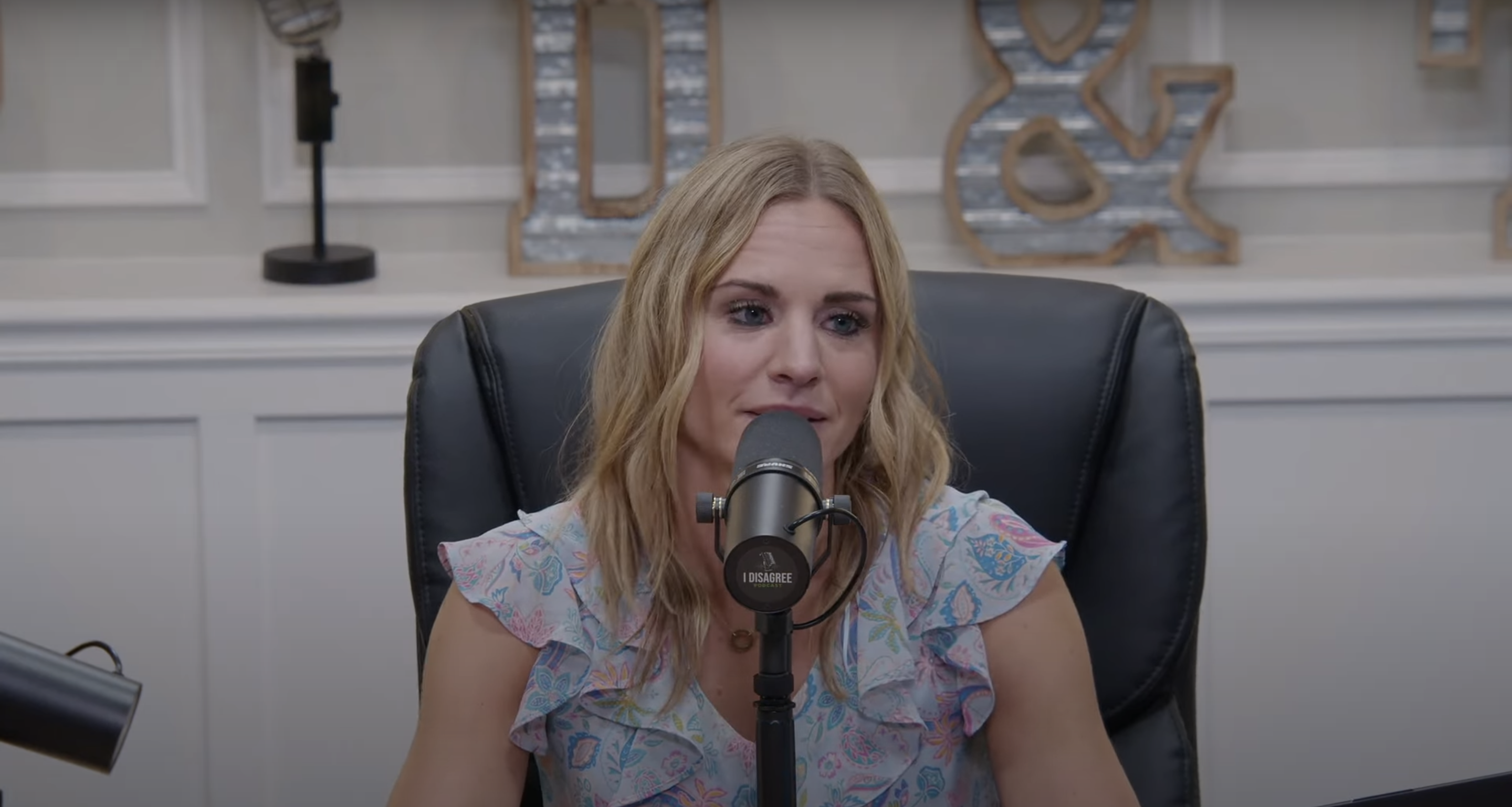
Dana Dilling co-hosts the I Disagree podcast and is known for her controversial opinions on masculinity and femininity. | I Disagree Podcast, YouTube: @IDisagreePod
Dana Dilling co-hosts the I Disagree podcast and is known for her controversial opinions on masculinity and femininity. | I Disagree Podcast, YouTube: @IDisagreePod
Counter-cultural podcaster and content creator, Dana Dilling, is one of the women taking hold of the discussions on masculinity and femininity in the podcast scene. She co-host’s the Wisconsin-based podcast I Disagree, where she and three other men share controversial views on gender roles, politics, religion, and health. “We are saying out loud the things that a lot of people are too scared to say,” she said.
When we look at the podcasting industry, specifically the shows that discuss dating, life advice, and gender roles, there’s a commonly associated image. It usually looks like a group of men across a range of ages huddled around microphones, possibly saying something that people are either going to praise or absolutely hate. The podcast is then re-edited to suit short-form video social media platforms, with bright neon subtitles spelling out their opinions and arguments.
Podcasts, especially of the alpha-male genre, have developed a distinct look with short clips and neon subtitles. | Brad Lea, Instagram: @therealbradlea
When women share this scene, it’s not uncommon to see them as guests who are on the defence. A clip of a Whatever podcast host telling a group of female OnlyFans creators that they provide nothing of value to the marketplace has gained over 800,000 likes on YouTube Shorts. In another clip from the podcast Fresh and Fit, a host calls a woman delusional for saying she doesn’t dress or do her makeup for validation from men. Dilling, however, is a stark contrast, saying on her most popular podcast episodes how women should give their men oral sex when they’re on their period and how women shouldn’t gain weight because it embarrasses the man.
This is not Dilling’s first foray into the gender debate online. Starting in June 2023, she began posting videos to her TikTok and Instagram accounts, @danadisagrees, about the roles men and women need to serve to have strong relationships. As of May 2024, she’s cultivated 53,000 Instagram followers and over 1,900 followers on TikTok.
The 35-year-old says that the inspiration for her content comes from a genuine, “passionate” interest in people and relationships. “I just think that people and relationships are super interesting, and I think it’s getting lost in culture a lot how the masculine is supposed to work along with the feminine,” she said.
Divine feminine coaching teaches women to tap into traditional gender norms
This same passion to bring back traditional masculinity and femininity served as the main motivation for Chloe Hennessey, 29, to begin her divine feminine coaching business. Opening her service to the masses five years ago through her Instagram account, @divinefemininemind, she helps curious women reclaim their feminine energy and allow men to provide. She said: “I feel passionate about bringing the balance back into nature with the masculine and feminine energy.”
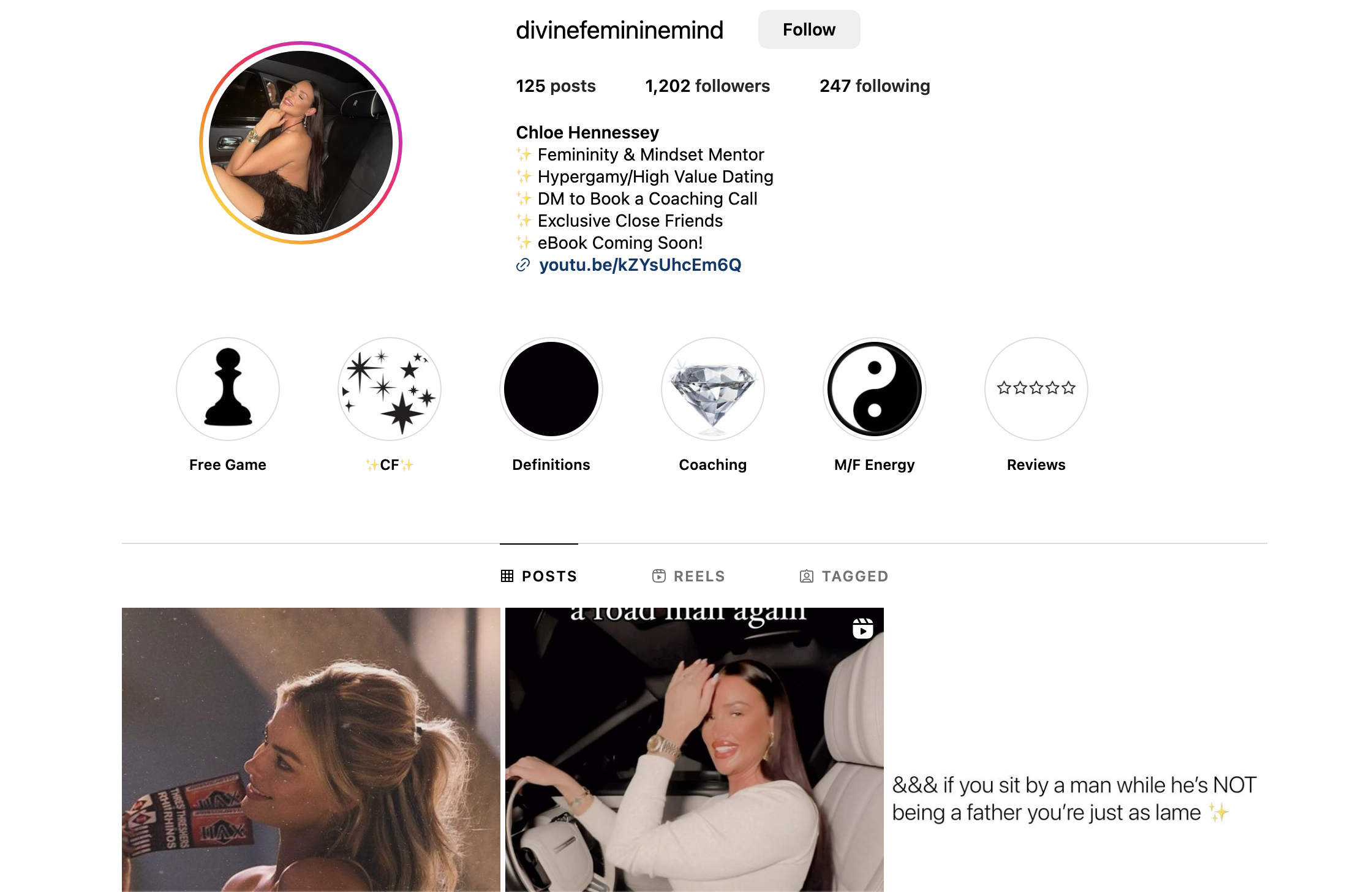
Chloe Hennessey runs a divine feminine account, where she promotes her coaching service as well as femininity tips. | Chloe Hennessey, Instagram: @divinefemininemind
Chloe Hennessey runs a divine feminine account, where she promotes her coaching service as well as femininity tips. | Chloe Hennessey, Instagram: @divinefemininemind
Hennessey is just one of many in the feminine mentoring business. A quick search for “femininity coach” on Instagram provides an extensive list of accounts dedicated to teaching women everything there is to know about femininity. This divine feminine energy is usually explored across a range of aesthetically pleasing posts that detail the steps a woman can take to improve themselves. Some of these include being vulnerable, not being too loud, and not competing with men.
The term "divine feminine" is taking over online discussions of how women should show up in society, with a community of coaches and influencers helping lead the digital masses to traditional gender roles. Vox's Mollie Hib, alongside divine feminine coach Chloe Hennessey and global digital politics lecturer Dr Kathryn Higgins, discuss what the concept truly means and why people are following it.
With heavy emphasis on how to be attractive to men, one could question if the content advocating for women to revert to traditional femininity is really for the good of women. Hennessey clarified, though, that “it’s not all about men” and that “it’s actually how you feel within yourself- to feel feminine and confident”.
Dilling’s quest to revert to pre-feminism gender roles presents a blurrier approach. Much of her content speaks on how a woman should be with her partner, such as her advice to give oral sex during your period out of respect for the man, which extends to a whole series of videos that went viral. The highest performing video of that saga has reached 14.6 million views on Instagram.
Dana Dilling's most viral video on Instagram is her advice for women to provide a week of oral sex for their partner while they are on their period. | Dana Dilling, Instagram: @danadisagrees
Though the advice is on how women should adjust themselves to improve their relationships, Dilling says that her audience is 94.7% men, with just 5.3% being women. Despite the gender disparity with who’s engaging with her content, she feels fulfilled as one of her main goals is to empower men. “The backbone of society is strong men. That’s how society thrives. And so, one of my goals is to be able to tell men that ‘your masculinity is good, it’s not toxic’,” Dilling said.
Regardless of the male-driven content, she still believes she’s using her voice and platform to speak on how other women are feeling in modern-day society. Dilling said: “There’s probably a lot of women out there who are either thinking what I’m thinking and they’re too afraid to say it, or they aren’t thinking the way that I’m thinking, and this is a good opportunity to present some other information.”
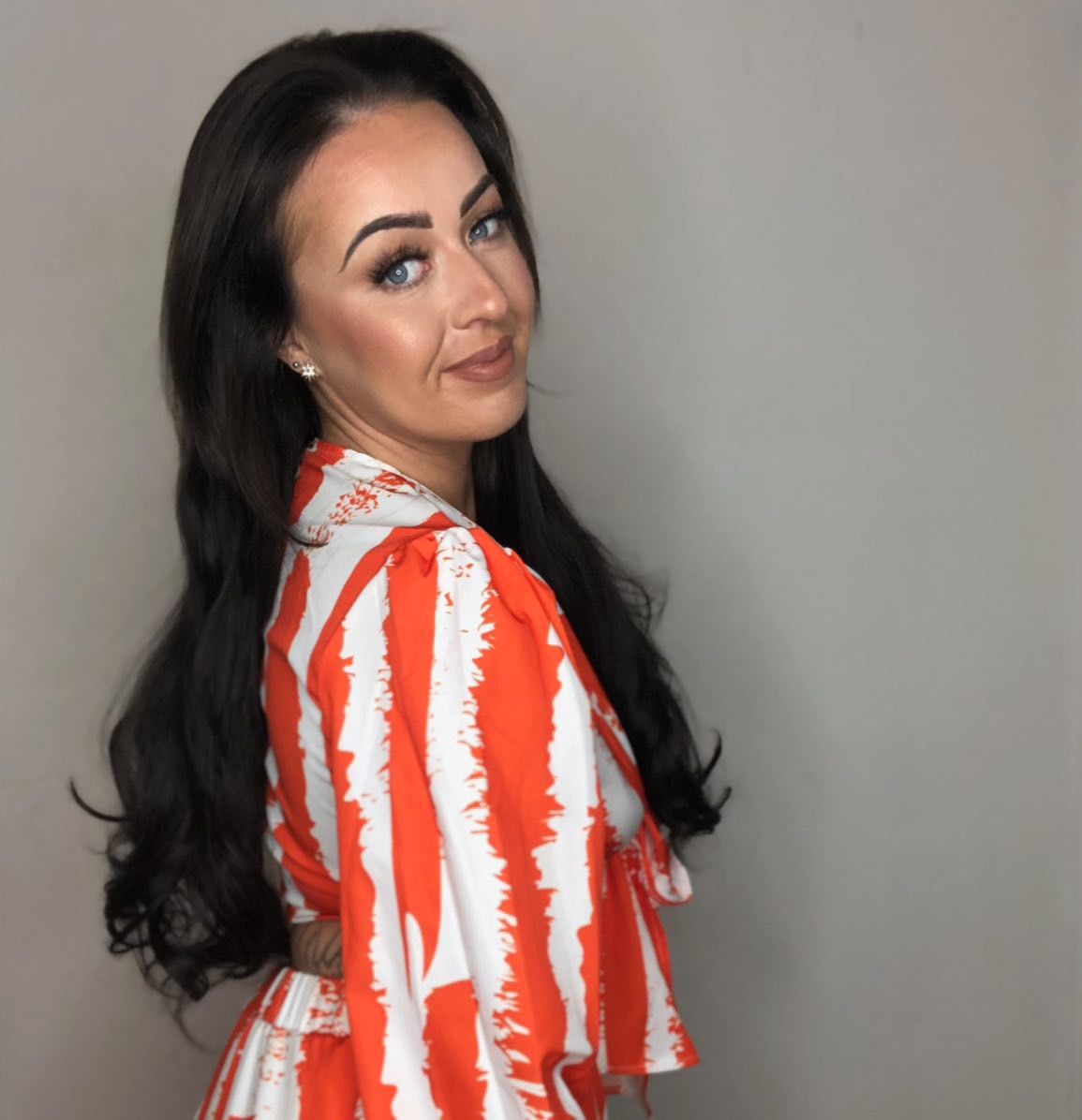
Lydia Rose hosts the Sisterhood podcast, where she focuses on highlighting inspiring stories. | Lydia Rose
Lydia Rose hosts the Sisterhood podcast, where she focuses on highlighting inspiring stories. | Lydia Rose
Host of the London-based Sisterhood podcast, Lydia Rose, disputes these benefits. “The only thing the podcast industry has influenced is conversations, tension, and a battle of the sexes,” she said.
Rose began her content creation career in 2021 by posting to Instagram about her views on dating and the sexual and racial politics involved. She went onto work in audio production, collaborating with companies like Audible and podcaster Jack Whitehall, and officially began her own podcast with co-host Sherrilyn Speid in 2023. The podcast, which was awarded podcast of the year at the 2023 Creative Industry Awards, is described by Rose as one that “promotes unity and real-life stories”.
She added: “Our show is for anyone who wants to feel inspiration because the beautiful thing is that even with our sad stories, our guests are still standing and smiling… so it’s for anyone who has gone through trials and tribulations.”
In April 2023, Rose posted to both her personal and Sisterhood’s podcast’s accounts criticising podcast host and counter-cultural commentator Pearl Davis, who’s been infamously nicknamed the female Andrew Tate. In the video, she refuses to call Davis’ podcast “pro-men” but rather “pro-bullying”.
“Talking about what you hate as a man is not an empowering and uplifting conversation,” the Sisterhood host said. Rather than focusing on what women aren’t doing right, Rose’s approach to gender role discourse on her podcast is based in opening an honest and respectful dialogue on how women can better help men with their struggles.
But respectfulness can come at a cost. In a digital age with new content creators every day and where the algorithm rules over who gets seen, are these women, and other podcasters alike, just playing up their challenging views for more views?
Podcasters exaggerate extreme opinions for engagement
“There’s this negative connotation that ‘they’re just doing it for likes and shares and clicks’ and it’s like, isn’t everybody doing that?” Dilling says.
The podcast host added that on the I Disagree show they purposely say things from a counter-cultural angle in order to gain attention. Dilling says she even adjusts the way she speaks to retain influence. “Was [what I said] racy? Yes. Did I say it in a racy way on purpose? Yes, because that’s the point,” she said.
Rose said that it’s “100% true” that many of the controversial podcasters don’t carry the same energy of extremity off the microphones and cameras. She also added that in her own experience, she noticed her content getting shared less when she “toned down” her approach and had “less spicy” opinions.
Dilling wouldn’t comment on whether other content creators truly mean what they say but still stands by her words. “The things that I’ve put out have been things that I absolutely agree with and sometimes I just say them in a sassier way because I know a lot of people agree with this,” the podcaster said.
The I Disagree host hopes that through women in podcasting like herself and Pearl Davis, they’ll be able to “take the pendulum and swing it back” to a society where traditional gender roles are normalized. She added: “I think a lot more women will come around when they see the benefits of having that strong masculine man leading.”

Podcasts and other independently made content is exceeding the reach of mainstream media. | Tada Images/Adobe Stock
Podcasts and other independently made content is exceeding the reach of mainstream media. | Tada Images/Adobe Stock
Divine femininity coach Hennessey credits podcasts like Dilling’s, and specifically Andrew Tate’s, for what she feels is a rise in people normalising the desire to bring traditional gender roles back. She explained that it feels “nice” to have public figures like Tate “who understand”. The 29-year-old also noted that with the convenience of social media algorithms pushing forward similar content from one click of the like button, the views and messages of these podcasts are being exposed to us more than ever, exceeding the reach of mainstream media.
Lecturer of global digital politics and feminist media scholar at Goldsmiths University of London, Dr Kathryn Higgins, also highlights the rise of digital media as a major turning point in the way gender is constructed. “In the nineties or the mid-2000s, audiences were very much just receivers of representation,” Higgins said. Now that content creation is much more accessible for people in the digital age, we are creating just as much content as we consume. Higgins said that as a result, “we all participate in the construction agenda as much as we had everyone on the receiving end of that production”.
The tradwife: our domestic lives are becoming increasingly aestheticized
Quite possibly one of the trendiest ways in which women are taking control of reconstructing traditional gender ideals is through tradwife content. The tradwife, as explained by TikTok user @esteecwilliams, is a woman who believes in “ultra-traditional” roles in marriage, such as submitting to their husbands and staying at home. On the short-form video platform #tradwife has 20.8 thousand posts, some of actual tradwife creators showcasing their daily lives cooking and caring for their children in pristine dresses, and other videos being parodies of them.
Estee Williams, a tradwife influencer with nearly 190,000 TikTok followers, described tradwives as women who prefer "ultra-traditional" gender roles. | Estee, TikTok: @esteecwilliams
Anyssa Frazier, 19, is an avid follower of popular tradwife influencer Nara Smith, and wants that life for herself too. Having always loved taking care of children and the idea of being a stay-at-home mom in the future, she “especially wanted to” after she saw TikToks of the lifestyle, including its charm of cooking everything from scratch.
However, Higgins questions boiling down the popularity of tradwife content to simply women resonating with that lifestyle. “Over the last five to ten years, but especially in the post pandemic years, there’s been a turn towards aesthetic culture,” she said. Higgins argues that there’s an added importance of domesticity to the content we consume, where general aesthetics and trends don’t just apply to one’s fashion or music anymore, but rather encompasses someone’s entire lifestyle.
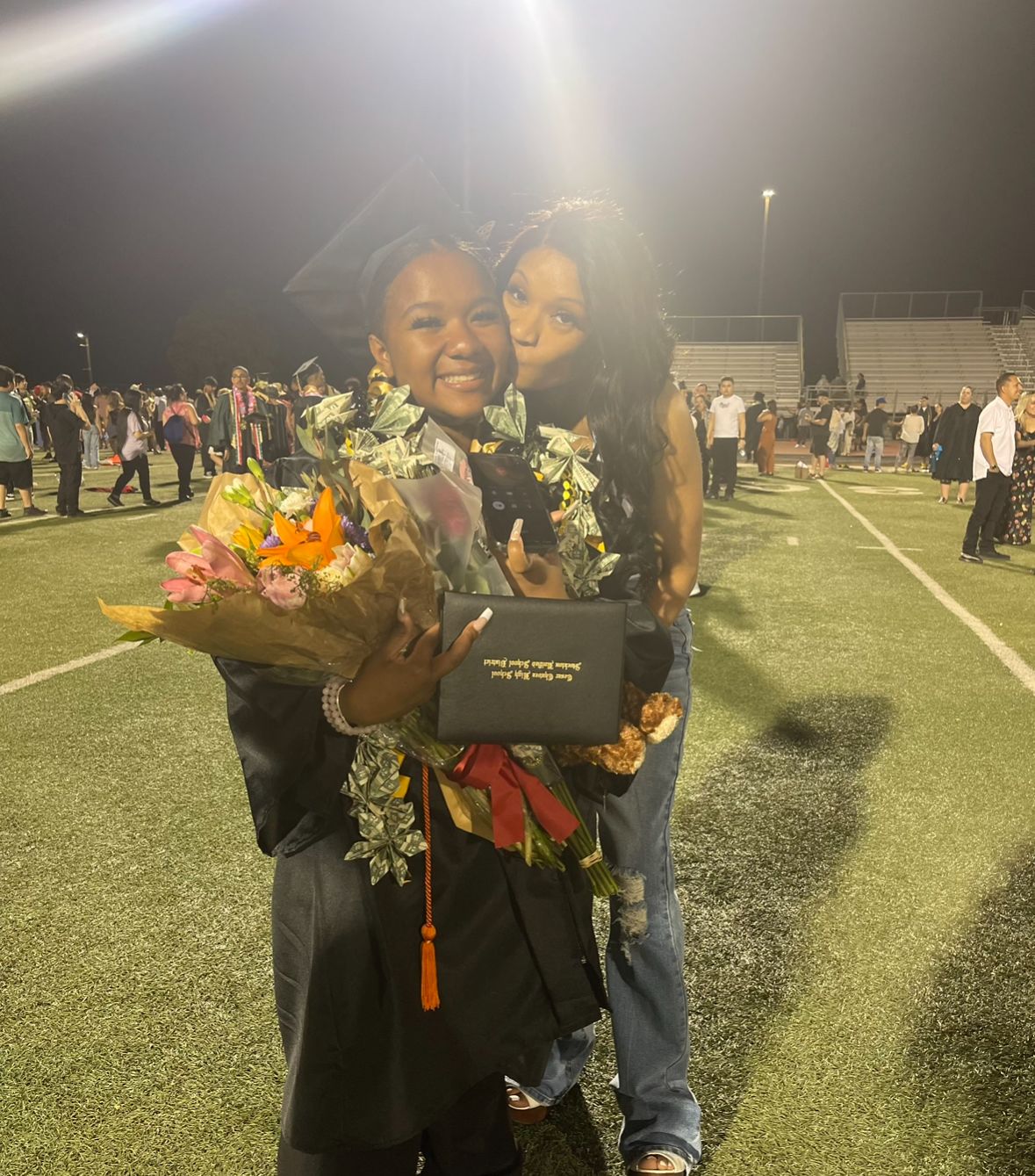
Anyssa Frazier with her mother at graduation. | Anyssa Frazier
Anyssa Frazier with her mother at graduation. | Anyssa Frazier
Frazier isn’t so convinced that this is the case, at least not for her. Growing up with a single mother and a younger sibling, she knows that there’s more to being a mother than wearing elegant gowns and cooking in the kitchen that somehow never gets dirty. “The aesthetic of it never really drove me to it,” she said. The 19-year-old added: “I love nurturing kids and showing them love and affection that they may not be able to get anywhere else besides the one that I provide.”
Although it’s been a dream of hers since she was young to live this kind of lifestyle, there’s one problem: she’ll only live it when she feels like she can afford it.
Anti-feminism may be anti-capitalism repackaged
Even though reverting to traditional gender norms typically entails women not being in the workforce, Dilling and Hennessey both would never tell women to not work. While they encourage people to go back to what is “natural”, with men being the hunters and women taking care of the home, the podcast host was skeptical of more women becoming tradwives in the future. “There’s kind of an economy to think about, so can you actually afford for that to happen?” she said.
For the divine feminine coach, much of her criticism for feminism was being part of the workforce. “This feminist movement [has conditioned] women to be working and be torn away from their children,” she said. Hennessey also added that a woman being a CEO is “the most ugly thing that a man can come across”. But even with supposed disdain for the working woman, she admits that no one should completely financially rely on a man, and that having your own personal income from more feminine jobs like a hairstylist is advice she’d give to anyone.
It becomes increasingly probable that women aren’t necessarily becoming anti-feminist, but anti-capitalist. The glorified girlboss that was birthed from Sophia Amoruso’s 2014 memoir, #Girlboss, has been dismantled. With a report from Axios and SurveyMonkey finding that 54% of US’ Gen Z (aged 18-24) survey respondents had a negative view on capitalism, this desire for women to embrace a traditional role in society again could be a by-product of these economic attitudes.
Higgins said: “I think it isn’t too much of a stretch to imagine that the type of woman that tradwife content is trying to appeal to is a woman who feels like she was promised happiness and fulfilment through work and hasn’t found it.”
It’s hard to say if this movement towards hyper-femininity and tradition is purely a response to the rise of counter-cultural podcasts. While their influence on certain areas of society is to be expected due to their immense popularity, the influences on women's attitudes towards how they want to contribute to society are much more complex. As women reclaim what they see as true feminine nature, a common thread between them is the inevitable acknowledgment of the world’s harsh economic reality. Can you really blame them for wanting peace and comfort?
